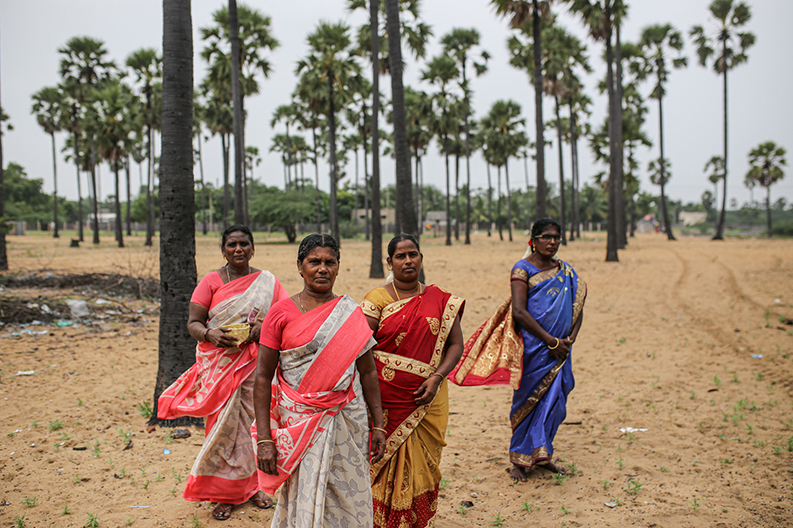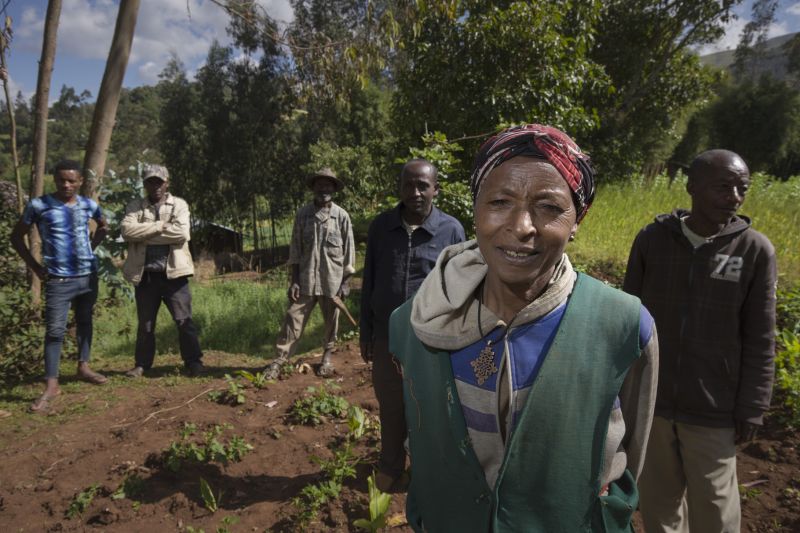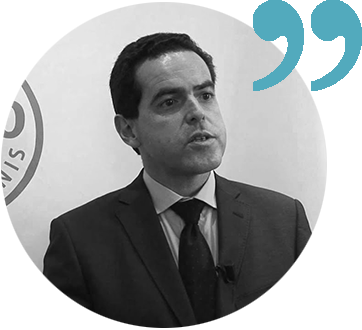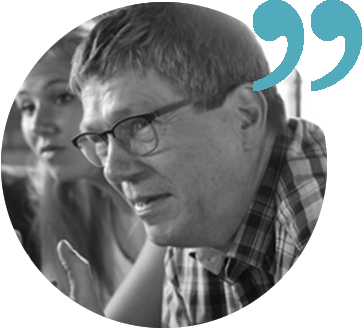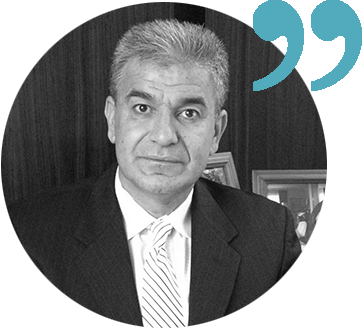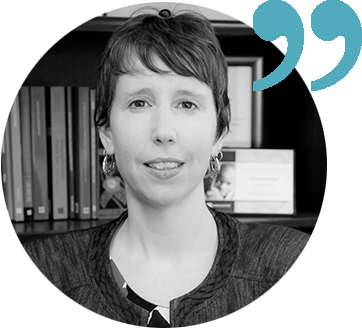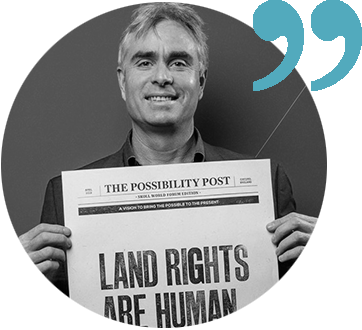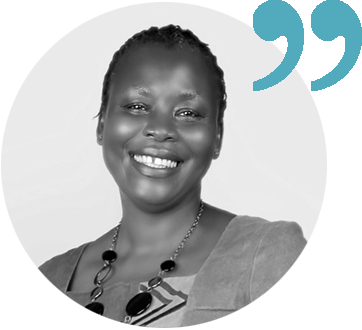Land Governance
Land is one of the most valuable resources a rural family can own to secure its livelihoods. Secure land holding can contribute to social inclusion, help protect human rights and support climate change adaptation and mitigation. Without secure land tenure, families and communities in rural, peri-urban and urban areas are vulnerable to conflict, displacement and expropriations, and may experience a variety of challenges to access natural and financial resources, markets, and other services.
The Global Donor Working Group on Land (GDWGL) was established in April 2013 by the global donor community during the Donor Roundtable Meeting in Washington. The group was formed on the margins of the annual World Bank Conference on Land and Poverty, in response to: (i) the sharp and volatile increases in food prices that began in 2008; (ii) following the endorsement of the Voluntary Guidelines on the Responsible Governance of Tenure of Land, Fisheries, and Forests in the Context of National Food Security (VGGT) and; (iii) the experience of donor coordination to support those important negotiations.
Topic | Organisation | Updates | Members
Three reasons why we engage
The Thematic Working Group
Organizational structure
- The GDWGL is a network of twenty-nine bilateral and multilateral donors and international organizations cooperating on land-related issues worldwide. The group is facilitated by the Global Donor Platform and is currently chaired by USAID and The Netherlands. The Chair is held on a rotating basis by one of the Group's member organisations.
- The Group routinely hosts side events during high-level conferences and forums. Physical meetings are held twice a year, usually in March during the World Bank Conference on Land and Poverty and in October during the Committee on World Food Security. Between these face-to-face meetings, the group also holds regular conference calls to discuss engagement in specific processes, to agree and report on annual activities, and exchange information on country-level programmes, amongst other items.

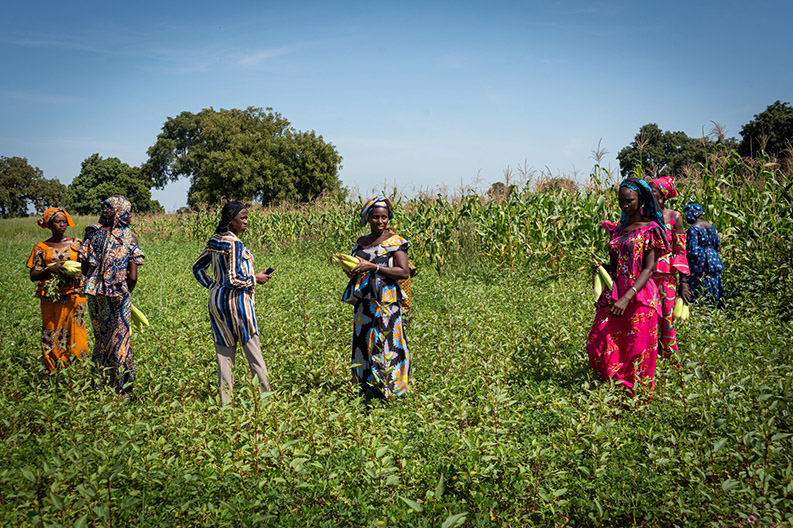
Our priority areas
Land Tenure and Resource Governance
- The governance of land tenure and other natural resources is core to achieving food security, poverty eradication, rural development, environmental protection, reduction of the effects of climate change and sustainable social and economic development. A significant challenge remains in how to coordinate initiatives that ensure land tenure security is improved in an inclusive and effective way. Read More.
Country-level Coordination
- Coordination has always been a core purpose of the GDWGL since its inception Its members have endorsed a Code of Conduct on country-level coordination that sets out their commitments to pursue closer coordination and complementarity of new land programmes and research. Read More.
Land Governance and Food Systems
- The governance of tenure is fundamental to a sustainable food systems as equity and inclusion are important pillars in the transformation process. How society manages access to, control over, and use of land and natural resources is central to food production and consumption. Agricultural productivity (FAO 2011) and food availability refer to the type and diversity of food on offer, with close links to land and water access through food production systems (HLPE 2017).
Highlights
The Voluntary Guidelines on the Responsible Governance of Tenure of Land, Fisheries, and Forests in the Context of National Food Security (VGGT). The GDWGL has been a key player in advocating the use of the VGGT as well as in supporting dialogue spaces where land and development experts can share their lessons learnt from the implementation of the VGGT. A landmark result of this effort was the endorsement of the VGGT by the Committee on World Food Security (CFS) in 2012. The VGGT is the first internationally negotiated and agreed upon soft-law instrument on the governance of land tenure. Read More.
The SDGs Land Indicators 1.4.2 and 5.a.1. The GDWGL advocated for the inclusion of land indicators under the Sustainable Development Goals, to alleviate poverty, enhance gender equality, and promote sustainable cities and communities. This has been instrumental in the process of raising the importance of the indicators from Tier II to Tier I. Read More.
The Land Governance Programme Map. This interactive mapping tool shows where donors and development agencies are working with respect to land and resource governance and the investments made to implement the VGGT. Read More.
State of Land Tenure and Governance Report: In 2019, on the sidelines of the African Land Policy Conference, the GDWGL endorsed a concept note for a Global Land Governance Report. The key objective is to produce an evidence-based report on the status of land tenure and governance issues for policy makers and others, one that links land to critical agendas such as implementation of VGGTs, SDGs, sustainable food systems, climate change, gender equality and biodiversity among others. The working group has also supported the development of a detailed outline for the report based on extensive key informant interviews and a review of existing data sources. Having supported this important early work, the GDWGL is encouraged to note that the report will move forward with the support of FAO, GLTN and UN-Habitat, the International Land Coalition and other partners.
Updates
RESOURCES >
Publications
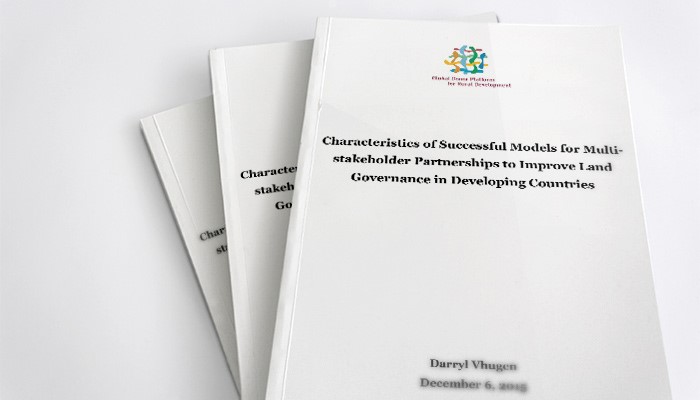
CHARACTERISTICS OF SUCCESSFUL MODEL FOR MULTI-STAKEHOLDER PARTNERSHIPS TO IMPROVE LAND GOVERNANCE IN DEVELOPING COUNTRIES
Strategic alliances between business, government and civil society are a growing feature of both developed and emerging economies.
Meeting Minutes
-
 TWG_LAND_MINUTES_2022-04-07 (PDF, 446.4 KiB)
TWG_LAND_MINUTES_2022-04-07 (PDF, 446.4 KiB)
-
 TWG_LAND_MINUTES_22-05-25 (PDF, 357.7 KiB)
TWG_LAND_MINUTES_22-05-25 (PDF, 357.7 KiB)
-
 TWG_LAND_MINUTES_2022-01-14 (PDF, 364.0 KiB)
TWG_LAND_MINUTES_2022-01-14 (PDF, 364.0 KiB)
-
 TWG_LAND_WORKSHOP_MINUTES_2022-01-12 (PDF, 362.1 KiB)
TWG_LAND_WORKSHOP_MINUTES_2022-01-12 (PDF, 362.1 KiB)
-
 TWG Land_Minutes_2021-10-07 (PDF, 302.4 KiB)
TWG Land_Minutes_2021-10-07 (PDF, 302.4 KiB)
-
 TWG Land_Minutes_2021-09-16 (PDF, 153.6 KiB)
TWG Land_Minutes_2021-09-16 (PDF, 153.6 KiB)
-
 TWG Land_Minutes_2021-07-01 (PDF, 154.5 KiB)
TWG Land_Minutes_2021-07-01 (PDF, 154.5 KiB)
-
 TWG Land_Minutes_2021-03-25 (PDF, 104.0 KiB)
TWG Land_Minutes_2021-03-25 (PDF, 104.0 KiB)
-
 TWG Land_Minutes_2021-02-05 (PDF, 168.3 KiB)
TWG Land_Minutes_2021-02-05 (PDF, 168.3 KiB)
-
 TWG Land_Minutes_2020-07-28 (PDF, 166.7 KiB)
TWG Land_Minutes_2020-07-28 (PDF, 166.7 KiB)
-
 TWG Land_Minutes_2020-05-13 (PDF, 211.4 KiB)
TWG Land_Minutes_2020-05-13 (PDF, 211.4 KiB)
-
 TWG Land_Minutes_2020-01-27 (PDF, 220.9 KiB)
TWG Land_Minutes_2020-01-27 (PDF, 220.9 KiB)
-
 TWG Land_Minutes_2019-09-11 (PDF, 481.1 KiB)
TWG Land_Minutes_2019-09-11 (PDF, 481.1 KiB)
-
 TWG Land_Minutes_2019-11-25 (PDF, 698.9 KiB)
TWG Land_Minutes_2019-11-25 (PDF, 698.9 KiB)
Links and further resources
Members
The group currently has members from:


